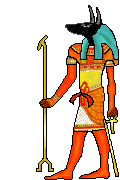 |
 |
 |
 |
 |
 |
 |
 |
 |
 |
 |
 |
![]()
 |
 04-08-2007, 12:21 PM
04-08-2007, 12:21 PM
|
#41 |
|
Lord Ao
Join Date: May 15, 2005
Posts: 2,092
|
I thought agnostics were supposed to be wishy washy, and what you're getting at, god is unknowable and irrelevant, was universalism?
|

|

|
 04-08-2007, 09:14 PM
04-08-2007, 09:14 PM
|
#42 |
|
Symbol of Cyric
Join Date: September 15, 2002
Location: Peterborough, ON, CANADA
Age: 60
Posts: 1,394
|
Calling agnostics wishy-washy is kinda prejudiced and somewhat ignorant, not to mention insulting.
universalism is a more generic term that can be applied to specific concepts within many belief structures.
__________________
If I say \"Eject!\" and you say \"Huh?\" - you\'ll be talking to yourself! - Maj. Bannister, <b>Steel Tiger</b> |

|

|
 04-08-2007, 10:36 PM
04-08-2007, 10:36 PM
|
#43 |
|
Anubis
 Join Date: February 21, 2005
Location: ....
Age: 35
Posts: 2,473
|
Wow, this thread took a different turn than what I had hoped for. Lol;
I didn't mean this to be an atheist/ agnostic conversation. But thanks for the help , you guys. The first two pages were right on the dot. [img]smile.gif[/img] now, lets not borderline breech the TOS anymore
__________________
Spirit's 3d Dump, Check it out! 
|

|

|
 04-09-2007, 03:38 AM
04-09-2007, 03:38 AM
|
#44 |
|
Symbol of Cyric
Join Date: August 22, 2003
Location: Ohio, Go Tribe
Age: 37
Posts: 1,131
|
I'm a fairly strict Catholic, but I won't begrudge people their free will to worship what they believe in, or not worship in some cases. I think that if your a genuinely good person in life, you won't have anything to fear from death. I couldn't see God punishing someone just because they didn't go to the right church or something.
__________________
Veni, Vidi, Vici |

|

|
 04-18-2007, 06:20 AM
04-18-2007, 06:20 AM
|
#45 | |
|
Symbol of Cyric
Join Date: July 3, 2001
Location: Cornwall England
Age: 36
Posts: 1,197
|
Quote:
As to pagan, its 'defintion' will change on how the particular soceity (meant in the broadest terms) has constructed the word. It has no concrete defintion as such, so it could mean Earth religions, but equally is has been used to include polytheistic religions, even modern ones. |
|

|

|
 04-18-2007, 11:24 PM
04-18-2007, 11:24 PM
|
#46 |
|
Xanathar Thieves Guild
 Join Date: March 17, 2001
Location: Wichita, KS USA
Age: 60
Posts: 4,537
|
My polytheistic religion is Earth based. Simply meaning that Earth based does not necessarily rule out polytheistic.
__________________
To those we have lost; May your spirits fly free. Good Music: Here. Interesting read, one of my blogs. |

|

|
 04-19-2007, 02:42 AM
04-19-2007, 02:42 AM
|
#47 |
|
Bastet - Egyptian Cat Goddess
 Join Date: March 1, 2001
Location: Sweden
Age: 50
Posts: 3,450
|
A bit more about the two "a" words so broadly used
 as well as the wiki version of pagan. as well as the wiki version of pagan.Personally I like the sceptical part of agnosticism. Too bad it sin't more cynical and it would be my resting place  Agnosticism From Wikipedia, the free encyclopedia Agnosticism (from the Greek a, meaning "without", and Gnosticism or gnosis, meaning knowledge) means unknowable, and is the philosophical view that the truth value of certain claims—particularly theological claims regarding metaphysics, afterlife or the existence of God, god(s), or deities—is unknown or (possibly) inherently unknowable. Agnostics claim either that it is not possible to have absolute or certain knowledge of God or gods; or, alternatively, that while certainty may be possible, they personally have no knowledge. Agnosticism in both cases involves some form of skepticism. Demographic research services normally list agnostics in the same category as atheists and non-religious people,[1] although this can be misleading depending on the number of agnostic theists who identify themselves first as agnostics and second as followers of a particular religion. Atheism Atheism, in the broadest sense, is the absence of belief in the existence of gods or deities.[1][2] Other definitions combine this absence of belief with belief in the nonexistence of God,[3][4] or simply with the conscious rejection of theism.[5] The term atheism originated from the ancient Greek ἄθεος (atheos), which was derogatively applied to anyone thought to believe in false gods, no gods, or doctrines that stood in conflict with established religions. Polytheists deemed monotheistic views atheistic; early Christians, for example, were persecuted as atheists by authorities of the Roman Empire. With the spread of freethought, skeptical inquiry, and subsequent increase in criticism of religion, application of the term narrowed in scope. The first individuals to self-identify as "atheist" appeared in the 18th century; today, about 2.3% of the world's population describes itself as atheist.[6] Self-described atheists may share common skeptical concerns regarding supernatural claims, citing a lack of empirical evidence for the existence of deities. Common rationales include the problem of evil, the argument from inconsistent revelations, and the argument from nonbelief. Other arguments for atheism range from the philosophical to the social to the historical. In Western culture, atheists are frequently assumed to be irreligious or unspiritual. However, religious and spiritual belief systems such as forms of Buddhism that do not advocate belief in God or gods, have been described as atheistic.[7][8] Although some atheists tend toward secular philosophies such as humanism, rationalism, and naturalism, there is no one ideology or set of behaviors to which all atheists adhere. Paganism From Wikipedia, the free encyclopedia (Redirected from Pagan) "Pagan" and "heathen" redirect here. For other usages, see Pagan (disambiguation) and Heathen (disambiguation) Paganism (from Latin paganus, meaning "an old country dweller, rustic") is a term which, from a Western perspective, has come to connote a broad set of spiritual or cultic practices or beliefs of any folk religion, and of historical and contemporary polytheism religions in particular. The term can be defined broadly, to encompass the faith traditions outside the Abrahamic monotheistic group of Judaism, Christianity, and Islam. The group so defined includes the Dharmic religions, Native American religions and mythologies and Shinto as well as non-Abrahamic ethnic religions in general. More narrow definitions will not include any of the world religions and restrict the term to local or rural currents not organized as civil religions. Characteristic of Pagan traditions is the absence of proselytism, and the presence of a living mythology which explains religious practice. The term "Pagan" is a Christian adaptation of the "Gentile" of Judaism, and as such has an inherent Christian or Abrahamic bias, and pejorative connotations among Westerners, comparable to heathen, infidel, and mushrik and kafir (كافر) in Islam. For this reason, ethnologists avoid the term "Paganism", with its uncertain and varied meanings, in referring to traditional or historic faiths, preferring more precise categories such as polytheism, shamanism, pantheism, or animism. Since the later 20th century, however, the words "Pagan" or "Paganism" have become widely and openly used as a self-designation of adherents of polytheistic reconstructionism and neo-Paganism.
__________________
 Don´t eat the yellow snow |

|

|
 04-19-2007, 11:58 AM
04-19-2007, 11:58 AM
|
#48 | |
|
Symbol of Cyric
Join Date: July 3, 2001
Location: Cornwall England
Age: 36
Posts: 1,197
|
Quote:
|
|

|

|
 |
| Currently Active Users Viewing This Thread: 1 (0 members and 1 guests) | |
|
|
 Similar Threads
Similar Threads
|
||||
| Thread | Thread Starter | Forum | Replies | Last Post |
| Pagan coven seeks hate crime charges vs Christian group | Chewbacca | General Conversation Archives (11/2000 - 01/2005) | 48 | 05-06-2002 07:15 AM |
| You Might be a Pagan Redneck if.... | Garnet FalconDance | General Conversation Archives (11/2000 - 01/2005) | 13 | 02-14-2002 07:30 AM |